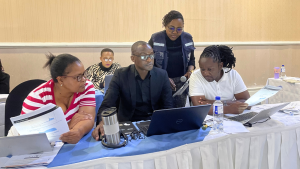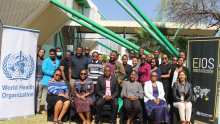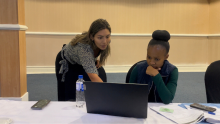Public Health Specialists in Botswana Enhance Epidemic Intelligence by using a WHO platform
The WHO-led Epidemic Intelligence from Open Sources (EIOS) training program equips public health specialists to strengthen Botswana’s public health infrastructure. In the ever-evolving landscape of public health, timely and accurate health emergency monitoring is a vital resource to track and respond to outbreaks.
Between 18 and 20 September 2023, in partnership with CDC Botswana, US Centers for Disease Control and Prevention (CDC) WHO facilitated a three-day workshop with 34 specialists from human, animal, and environmental health sectors in Botswana.
The Epidemic Intelligence from Open Sources platform is a cutting-edge approach to epidemiological surveillance that harnesses the vast wealth of information available through open-source channels such as news reports, social media, and other publicly available data. EIOS allows public health specialists to proactively monitor, detect, and respond to potential health threats in real time providing a crucial advantage in the race against infectious diseases. The initiative aims to prepare public health experts with the knowledge and skills required to navigate the vast information available online effectively and extract valuable intelligence that can inform public health decision-making.
“EIOS aims to strengthen public health intelligence by creating a unified All-Hazards, One Health approach to early detection, verification, assessment, and communication of public health threats.” WHO Hub for Pandemic and Epidemic Intelligence training officer Stefany Ildefonso explained during the training.
As WHO Regional Office for Africa continues with the expansion of the EIOS initiative and system across the region, Botswana becomes the 29th country to embrace this initiative aligning with WHO’s broader effort of strengthening and transforming surveillance systems in the African region.
Participants in the training learned how to navigate a complex digital landscape and extract relevant information from various sources. They were trained to sift through vast amounts of data, verify its accuracy, and analyze it to identify potential outbreaks or health crises in their communities. Through this training, participants gained valuable skills that empowered them to contribute effectively to their country's health security, enhancing job satisfaction and career development.
“The EIOS is a useful system for public health specialists like me. The Ministry of Health will use this system to reinforce our surveillance and response systems across our districts in Botswana. I will also teach my fellow colleagues, what I have learned during this workshop” Dr Reinar Mosimanegape said after completing the EIOS training.
The training also emphasized the importance of collaboration and information sharing among countries and organizations. Epidemics do not recognize borders, and a timely response often depends on the rapid exchange of information among countries. The training will not only benefit the people of Botswana but will also contribute to global health security by ensuring that no health crisis goes undetected or unaddressed. As the world continues to grapple with evolving health challenges, Botswana's approach of introducing EIOS as an incentive to continue working towards regional and global health collaborations.
Following the training session, Botswana established the EIOS focal point team aiming to enhance the country's public health surveillance efforts. During a meeting on 26 October, the team successfully identified key public health alerts to closely monitor and ensure the early detection of potential health threats. To streamline their surveillance activities, the team also created EIOS boards dedicated to human, animal, plant, and environmental health, thus broadening the scope of their monitoring. Furthermore, the team developed Botswana's EIOS weekly monitoring plan, outlining the systematic approach they will employ to proactively address emerging health concerns and safeguard the well-being of the people in Botswana.





